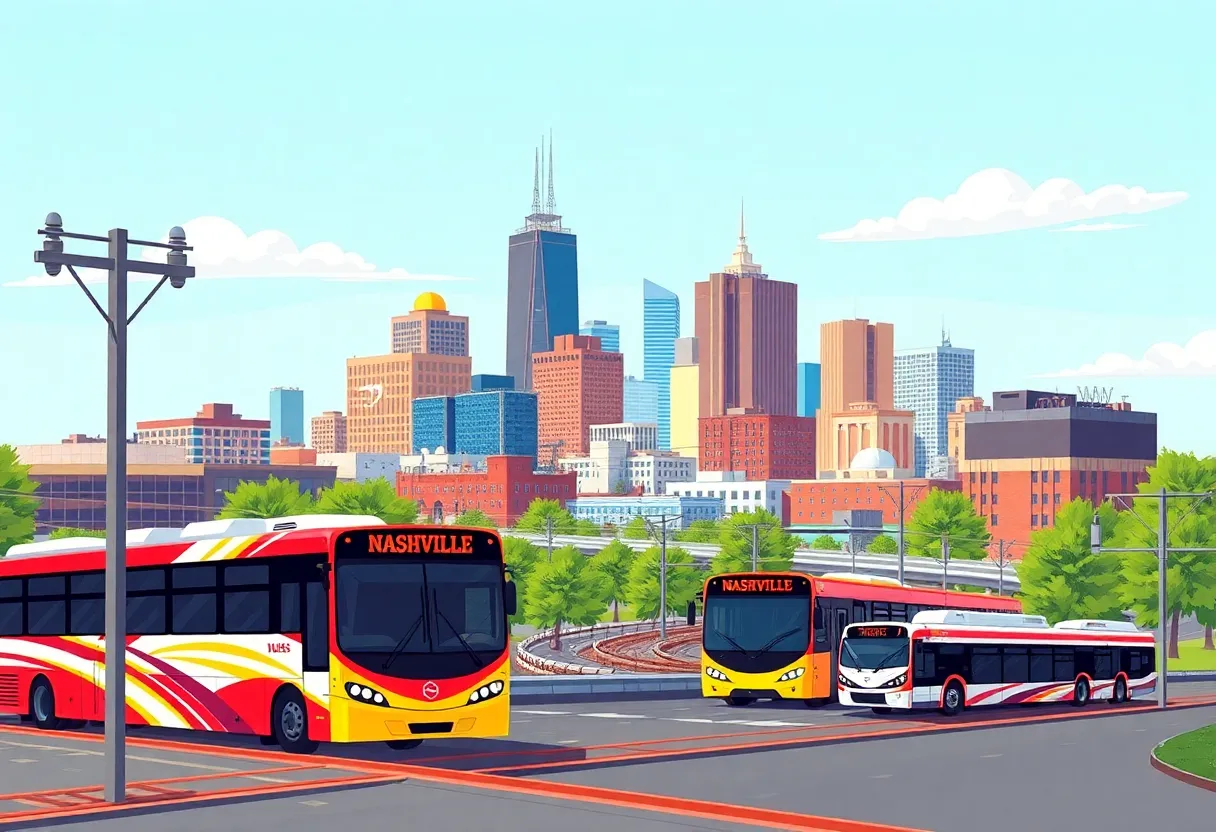News Summary
Nashville’s transit referendum, a $3.1 billion initiative aimed at improving city transportation, faces a legal challenge despite overwhelming voter support. The Davidson County Chancellor is reviewing claims that certain improvements, such as sidewalks and traffic signals, should not be included under Tennessee’s Improve Act. Metro officials contend the challenge is unfounded and promise to defend the plan vigorously. The outcome could significantly impact the future of Nashville’s transportation initiatives, especially given that over 280,000 residents supported the referendum.
Nashville Transit Referendum Faces Legal Hurdle Despite Overwhelming Support
In a city where music and traffic jams share the spotlight, Nashville’s transit referendum is hitting a roadblock. The Davidson County Chancellor, Anne Martin, has been deep in discussions regarding a legal challenge against the transportation plan that received overwhelming voter approval just last November. Here’s the scoop on what’s been happening.
What’s the Transit Plan All About?
The transit plan, backed by Mayor Freddie O’Connell, is a whopping $3.1 billion dollar initiative aimed at revolutionizing the city’s transportation landscape. Residents were initially delighted with the proposition of improved infrastructure, which, for many, meant less time stuck in traffic and more time enjoying the vibrant life of Nashville.
Funding for this ambitious plan is slated to come from a sales tax increase, lifting it from 9.25% to 9.75%. However, before any changes take effect – with the planned increase slated for February 1 – the legal proceedings surrounding this decision are in full swing.
The Legal Challenge Explained
The challenge against the referendum was initiated by the Committee to Stop an Unfair Tax, whose legal representation, attorney Kirk Clements, is raising eyebrows with claims that certain elements of the transit plan are improperly included. The argument hinges on the assertion that items like sidewalks and traffic signals do not fit the necessary criteria outlined in Tennessee’s Improve Act, a state law intended to regulate funding for mass transit projects.
Clements contends that these inclusions either stretch the definition of a public transit system or simply go beyond what is permissible according to state guidelines. He even goes as far as stating that the financial burden of the plan might be closer to $7 billion when inflation is factored in, leading many to wonder just how transparent the information presented to voters really was.
Counterarguments from Metro Officials
Chancellor Martin has yet to issue a ruling, but it’s clear that the legal team representing Metro is fighting back hard against these accusations. Metro’s attorneys, Lora Fox and Jeff Yarbro, assert that the challenge is misplaced and should have been presented before the election took place. They’ve emphasized that there were no credible claims of illegal voting or mass confusion amongst the electorate.
Metro officials also showcased images and evidence demonstrating how the proposed infrastructure improvements directly connect to transit services. In fact, Michael Briggs, the director of transportation planning for Metro, provided testimony suggesting the transit plan fits snugly within the guidelines of the Improve Act.
The Impact of Voter Turnout
The stakes are high. Over 280,000 residents from Davidson County turned out to cast their votes on this referendum, with an impressive near two-to-one majority in favor. Senator Yarbro made some solid points about how this significant turnout should affirm the legitimacy of the voters’ decision.
As the hearing progresses, Nashville is holding its breath to see how Chancellor Martin will rule. With many residents hopeful for a smoother commute in the future, the intersection of legal wrangling and public opinion hangs in the balance.
What’s Next for Nashville?
As Nashville continues to evolve and grow, the outcome of this legal challenge could influence how the city approaches future transportation initiatives. Whether the metro government will be able to push through the improvements promised in the referendum or if they will need to rework their strategy remains to be seen.
In the heart of Music City, where songwriters and performers thrive, the citizens are eager for a performance that will result in a better journey through their vibrant metropolis. Stay tuned, Nashville – we’ll keep you updated on what comes next!
Deeper Dive: News & Info About This Topic
HERE Resources
Nashville Chamber of Commerce Appoints New Leader
Nashville Offers Free Public Transit for New Year’s Eve
Nashville Voters Approve Major Transit Improvements
Nashville Voters Approve Historic Transit Plan, Signaling Nationwide Support for Public Transportation
Nashville Mayor Explores Possible Elimination of Grocery Tax Amid Rising Living Costs
Nashville Urged to Boost Voter Turnout as Election Day Approaches
Nashville Residents Face Rising Costs Amid Transit Tax Controversy
Nashville’s $3.1 Billion Transit Plan Faces Voter Decision in Referendum
Nashville’s WeGo Link Program Enhances Accessibility to Public Transportation
Excitement Builds in Nashville as Voter Participation Increases Ahead of November 5 Election Day
Additional Resources
- Tennessean: Nashville Transit Referendum Verdict Coming Quickly
- Nashville Banner: Davidson County Chancellor Transit Referendum
- Axios: Transportation Referendum Lawsuit Goes to Court
- NewsChannel 5: Nashville Voters Overwhelmingly Approve Mayor’s Transit Plan
- Wikipedia: Transportation in Nashville
- Encyclopedia Britannica: Public Transportation
- Google Search: Nashville Transit Referendum

Author: HERE Nashville
The NASHVILLE STAFF WRITER represents the experienced team at HERENashville.com, your go-to source for actionable local news and information in Nashville, Davidson County, and beyond. Specializing in "news you can use," we cover essential topics like product reviews for personal and business needs, local business directories, politics, real estate trends, neighborhood insights, and state news affecting the area—with deep expertise drawn from years of dedicated reporting and strong community input, including local press releases and business updates. We deliver top reporting on high-value events such as CMA Fest, Bonnaroo Music & Arts Festival, and Nashville Pride Festival. Our coverage extends to key organizations like the Nashville Area Chamber of Commerce and Nashville Health Care Council, plus leading businesses in healthcare, automotive, and technology that power the local economy such as HCA Healthcare, Bridgestone Americas, and Asurion. As part of the broader HERE network, including HEREBristol.com, HEREChattanooga.com, HEREKnoxville.com, and HEREMemphis.com, we provide comprehensive, credible insights into Tennessee's dynamic landscape.



